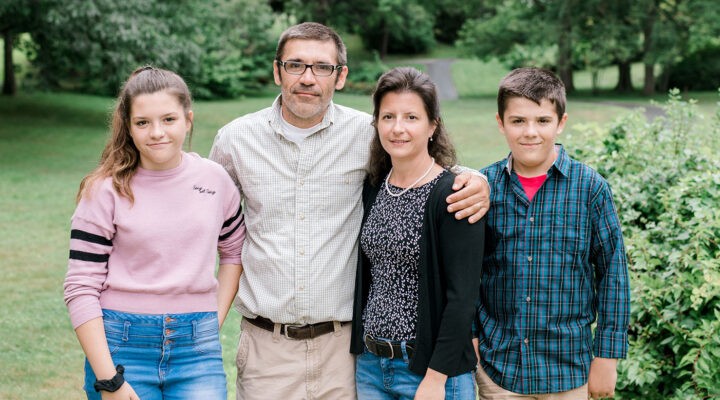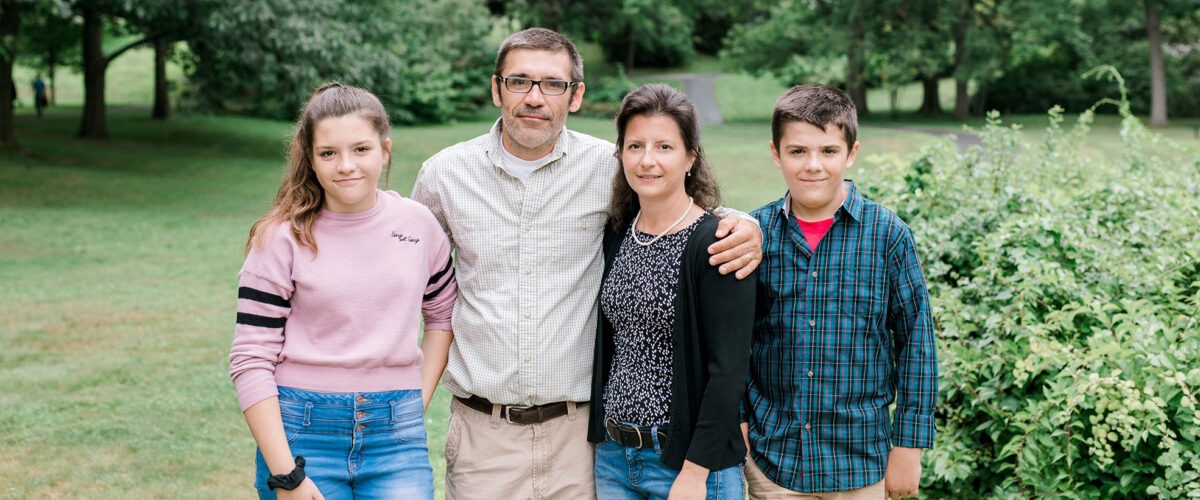Comments by justices of the United State Supreme Court Dec. 8 indicate likely support for parents of Maine high school students who want to use government funding to send their children to sectarian schools.
During oral arguments before the court in the case Carson v. Makin, justices in the conservative majority expressed amazement that the state of Maine would exclude sectarian schools from its program to compensate for some school districts that do not offer secondary schools.

Alan and Judy Gillis with their daughter at Bangor Christian Schools in Maine. The Gillises are one of three families that sued Maine over a program that bans families from a student-aid program if they choose to send their children to sectarian schools. (Photo by the Institute for Justice www.ij.org.)
To offset this missing component, the state provides funding for students who attend high schools in other districts or at approved private schools — both in-state and out-of-state. To qualify as an approved school, Maine requires that an institution be “nonsectarian.”
In the case now before the court, two sets of parents who sued the state specifically want to send their children to evangelical Christian schools that align with their preferred “worldview” and “sincerely held religious beliefs.”
To exclude some private schools from the program because they teach religion is discriminatory, according to Michael Bindas, an attorney for the parents. He explained that “religious schools teach religion. It is part of what they do. It is also part of who they are.”
The state of Maine’s position is that if parents want to send their children to faith-based schools, they are free to do so, but not with taxpayer funding. Just as public schools are expected to be non-sectarian, so should the state-funded alternatives to those schools, the state reasons.
Justice Sonia Sotomayor picked up that theme, observing that parents who live in Maine school districts with their own secondary schools don’t have an option to send their children to sectarian schools with government funding. Therefore, the current requirements are not discriminatory, because parents of affected children “are put to the same choice that every other parent in Maine is put to: Either get a free public secular education or pay for your religious training. They’re being treated as everybody else is.”
Conservative justices challenged that view on several fronts, including a focus on the state’s assertion that the tuition-assistance program is intended to provide the “rough equivalent” of a secular public education.
According to a report in SCOTUS blog, “Justice Clarence Thomas expressed bewilderment at … insistence that the ‘rough equivalent’ of a public education was an education that does not promote one particular set of religious beliefs at the exclusion of another. Perhaps, Thomas suggested, the focus of a public education should be on academic interests instead.”
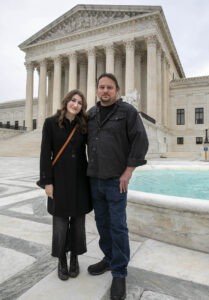
David and Olivia Carson outside the U.S. Supreme Court after oral arguments Dec. 8. They are among three families suing the state of Maine.
Under the terms of the Maine guidelines, the state tuition assistance may be used at non-sectarian schools ranging from nearby public schools to New England private prep schools. Justice Samuel Alito questioned whether New England boarding schools are really the equivalent of a public education.
Chief Justice John Roberts — who in the court’s current configuration often becomes the more centrist conservative — also questioned the exclusion of sectarian schools, giving an illustration that highlighted the difference between a sectarian school that teaches doctrine and a sectarian school that does not teach doctrine. Should those two “sectarian” schools be treated the same?
Christopher Taub, Maine’s chief deputy attorney general, replied that it is the teaching of sectarian beliefs that disqualifies a school from the program.
Roberts indicated his belief that such a distinction favors one religious tradition over another, including a religious tradition that is not compelled to indoctrinate students while excluding a religious tradition that is compelled to teach doctrine.
“That is the most basic violation” of the Constitution, Roberts said, “for the government to draw distinctions between religions based on their doctrines.”
Justice Brett Kavanaugh echoed the belief that excluding sectarian schools is discriminatory. That one family could send their children to a secular private school and receive the tuition assistance, while neighbors who send their child to a religious private school could not is “just discrimination on the basis of religion right there at the neighborhood level.”
“That is the most basic violation … for the government to draw distinctions between religions based on their doctrines.”
If the court follows this logic, it will be a significant departure from years of precedent that historically has drawn a sharp line between taxpayer funding of secular education versus sectarian education. A rallying cry of evangelical Christians has been that government should fund their religious schools in the same way public schools are funded.
Traditional Baptists and other staunch church-state separationists have steadfastly opposed any government funding of religion. But as the Southern Baptist Convention has swung in a more conservative direction over the past three decades, its leadership has joined other evangelicals in advocating for a much looser understanding of the traditional wall of separation between church and state.
While for evangelicals recent presidential elections have been about abortion, they also have been about changing the makeup of the Supreme Court, which will be one of the most enduring legacies of Donald Trump naming three justices to the court.
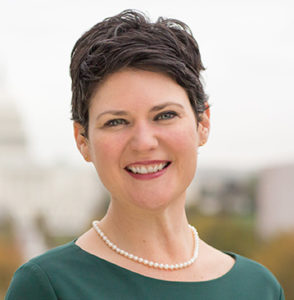
Amanda Tyler
“Today’s SCOTUS arguments in Carson v. Makin were very worrisome,” said Amanda Tyler, executive director of Baptist Joint Committee for Religious Liberty. “At stake is one of the key values of the First Amendment’s protection of religious freedom — government neutrality toward religion. Six members of the court seem ready to label that as religious discrimination.”
Because of the peculiar nature of the Maine case and the fact that it does not directly correspond to most of the rest of the nation, some court observers predict even a ruling in favor of the parents might not have broad effect.
However, Tyler explained: “The court may try to make its ruling seem limited but recent experience (Trinity Lutheran, Espinoza) shows that requiring government funding of religious organizations in seemingly narrow cases will be used next time to distort the religion clauses beyond recognition.”
In Espinoza v. Montana Department of Revenue (2020), the court ruled that a state may not bar a private religious school from receiving scholarship assistance through state tax credits.
“At stake is one of the key values of the First Amendment’s protection of religious freedom — government neutrality toward religion.”
In Trinity Lutheran v. Comer (2017), the court ruled that Missouri’s policy excluding churches from participating in a program using recycled tires to improve playground safety “expressly discriminates against otherwise eligible recipients by disqualifying them from public benefits solely because of their religious character,” and thereby “imposes a penalty on the free exercise of religion.”
The current court majority — echoing the view of conservative evangelicals — has been giving increasing deference to the Free Exercise Clause of the First Amendment over the Establishment Clause. Previously the court — echoing traditional church-state separationists — has sought to create a balance between the two clauses to allow free exercise of religion that does not favor one religion over another.

Rachel Laser
“Today’s oral arguments in Carson v. Makin revealed that the court’s conservative justices may be poised to turn America’s foundational principle of religious freedom on its head,” said Rachel Laser, president of Americans United for Separation and Church and State. “That principle has never been understood as requiring the government to fund religious education, but several justices seem prepared to reinterpret it to mandate exactly that.
“The same justices also seemed to ignore the hypocrisy of calling Maine’s program discriminatory for requiring religious neutrality, while at the same time forcing the state to fund private religious schools that discriminate against LGBTQ, non-Christian, and other students, families, and employees,” she added.
“Maine’s program is intended to support secular and inclusive education. Like church-state separation, public education is a unifying force in our society that ensures everyone is treated equally under the law regardless of what we believe, what we look like, our level of ability, or who we love,” Laser continued. “Yet religious extremists continue to pursue their long-term goal of diverting ever more money away from our public schools to private religious education — a trend that started in direct defiance of court-ordered desegregation.”
Although the immediate scope of the Maine case may be small, the precedent it could set would be enormous, she explained. “If the Supreme Court requires Maine to fund religious instruction, it will be the first time the court mandates that taxpayers must pay for religious activities — shamelessly undermining our country’s founding principles that form the core of our democracy.”
“If the Supreme Court requires Maine to fund religious instruction, it will be the first time the court mandates that taxpayers must pay for religious activities.”
Katy Joseph, director of policy and advocacy for the Interfaith Alliance, agreed.
“The Carson case is part of a growing movement to funnel money away from … community institutions and toward private religious schools, taxpayer dollars that are critical for retaining talented teachers and keeping the lights on. The Establishment Clause of the First Amendment prohibits the use of government funding for explicitly religious activities. A ruling mandating the use of public funds for religious schools would further starve already underfunded public school systems while inflicting lasting damage to the wall of separation between religion and government.
“While parents may choose a religious education for their child, they cannot insist that it be paid for by taxpayers,” she said.
On the other hand, a representative of the conservative advocacy law firm Beckett said she hopes the court will now connect the dots from Trinity Lutheran to Espinoza to Carson to settle the question of whether religious schools can receive government funding.
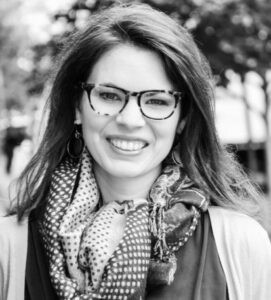
Diana Thomson
“Imagine thinking it is fair for privileged students attending elite out-of-state boarding schools to reap the benefits of tuition assistance, but not economically-disadvantaged kids wanting to attend their local religious school down the road,” said Diana Thomson, senior counsel at Becket. “Maine has created an absurd divide that treats religious education as second-class and harms the poor too.”
Speaking of the two earlier court rulings, Thomson said: “Maybe the third time’s the charm. It shouldn’t take multiple Supreme Court rulings to stop Maine from treating religious people like second-class citizens, but now that the issue is back before it, the Supreme Court should not hesitate to protect religious people not just for who they are but also for what they do.”
Baptist Press quoted one of the members of the legal team representing the Maine parents, Jonathan Whitehead, who is a Southern Baptist and a trustee of the SBC’s Ethics and Religious Liberty Commission.
“We are hopeful for a 6-3 win for the parents today, and their right to educate their children as they deem best,” Whitehead said.
Related articles:
There’s another big religious liberty case coming to the Supreme Court next week
Supreme Court opens new chapter of state funding for religious schools
Religious liberty advocates divided over Supreme Court’s Trinity Lutheran decision

